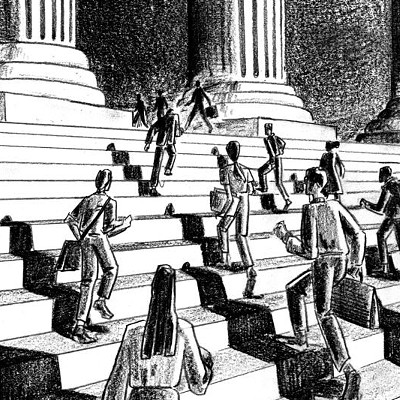This is her third relationship with a man and none has been good. In her view, women are vulnerable. "He kicks me out every week. I don't understand how I got into this. It's like a pattern for women. My second husband broke some bones and beat my children. Just recently, he told me, 'How could I hurt something I love so much?' Feminists cannot tell me women are not vulnerable because they really are. I was raised old-fashioned. You take care of your man. Dinner is on the table when he gets home from work." She doesn't want to live in a women's shelter because, she contends, she would be forced to accept the religious practices of the organizations administering them.
Pauline has knocked around the Southwest at the mercy of men since she graduated from high school in Alamogordo, N. M. Her first husband died, leaving her with a daughter now 18. She moved to Dallas, where she learned how to work in dialysis. She married a man who beat her badly enough to break some bones and she left him to go back to Alamogordo. But jobs were so scarce there she moved to Mesa, and started to live with another man, a construction worker. Together they moved to Tucson. She said she has never found employment here, mostly because buses do not operate during the hours when she could work at a hospital. Now, she regularly visits Casa Maria to get food for herself and her 11-year old son.
She is one of an army of poor women in Arizona who outnumber poor men. Arizona is one of the country's worst states for poverty among women--ranked 43rd.
Part of the problem is that women are too often burdened with children, without a man to help. It is a truism that single mothers are--because of their very singleness--more likely to be poor than married mothers. That means a growing number of children are poor. William Galston, a former Clinton administration adviser, contended that if you want to avoid poverty, you should do three things: finish high school, avoid having babies until after you are married and marry only after the age of 20. Seventy-nine percent of those who fail to follow that advice are poor, while only 8 percent of families who do are poor.
Today, cohabitation rather than marriage is a choice for many young Americans. But James Q. Wilson, a political scientist, believes such a choice has not been a thoughtful one. "[M]arried people, especially men, benefit greatly from marriage: they are healthier, live longer and are less depressed. But many young men today have not absorbed that lesson. They act as if sex is more important than marriage, worry more about scoring than dating and are rewarded by their buddies when they can make it with a lot of young women. To them, marriage is at best a long-term benefit, while sex is an immediate preoccupation. This fact supplies us with a sober lesson: the sexual revolution--one that began nearly a century ago but was greatly hastened by the 1960s--was supposed to help make men and women equal. Instead it has helped men, while leaving many women unmarried spectators watching Sex and the City on HBO."
Actually, single motherhood may be preferable for some women. Administrators of shelters for abused women in Tucson point to a disturbing pattern among their clients, recidivism. One administrator said that women will return time and time again to live with their abusers. "They have to experience abuse about nine times before--at the 10th time--they finally leave him for good."










